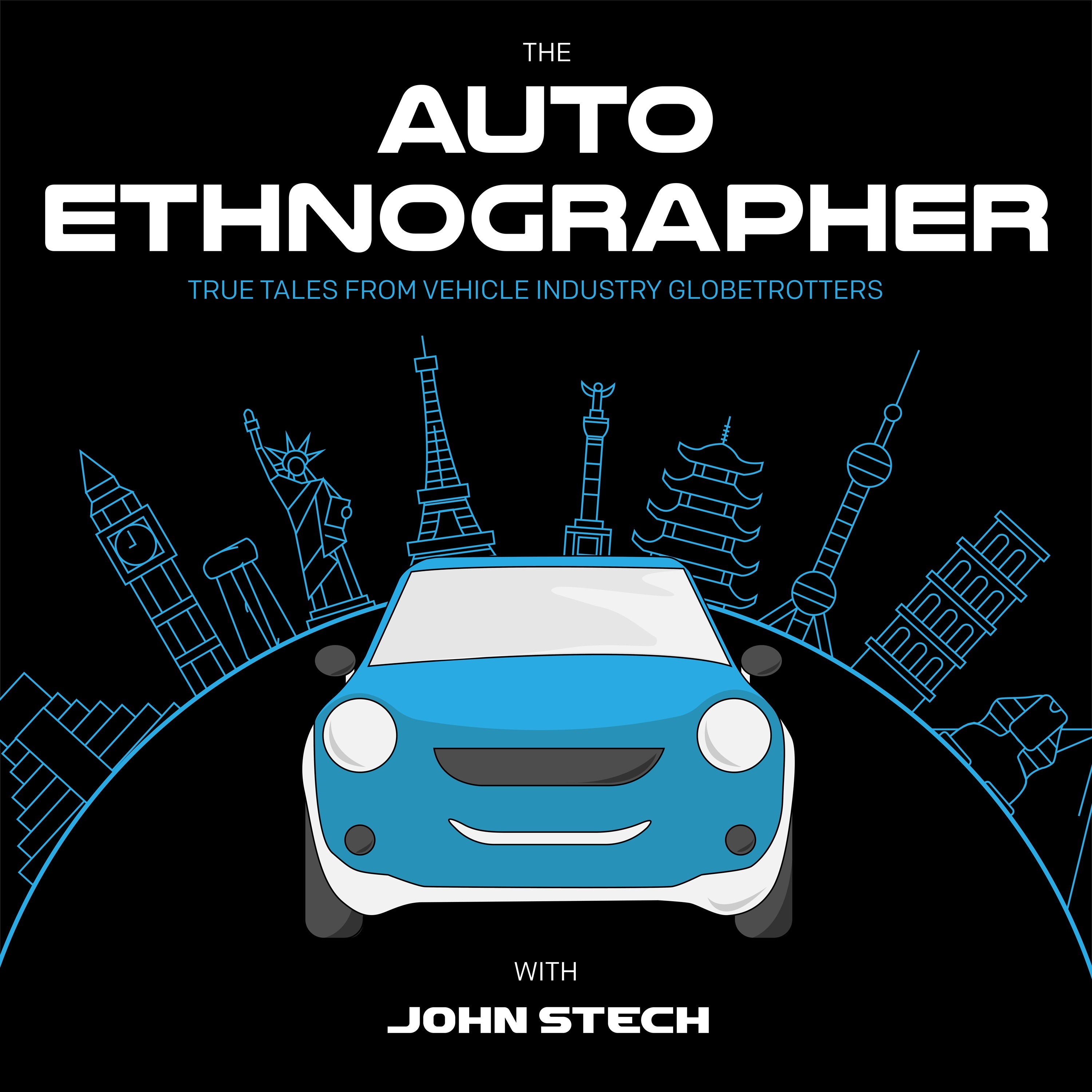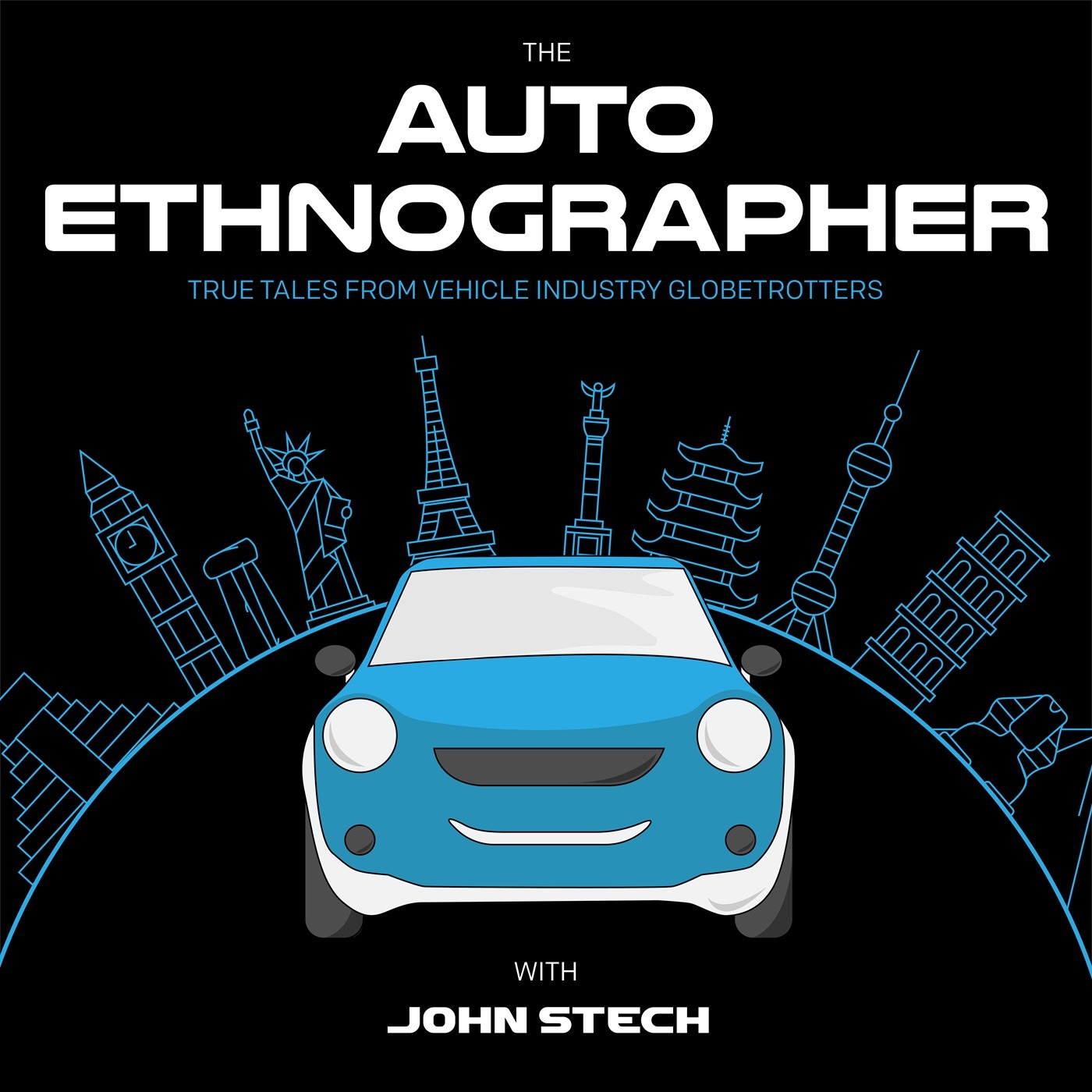The Auto Ethnographer with John Stech

The Auto Ethnographer with John Stech
Podcast Description
John Stech, The Auto Ethnographer, draws on his thirty years in the global automotive industry to bring the world to your doorstep in both an informative and entertaining way using a style rooted in autoethnography. What is "autoethnography"? Derived from Tony E. Adams’ definition, "autoethnography" is a research method leaning on the experiences of individuals to analyze assumptions, culture, communication, local norms, traditions, emotional impact, and how they mesh with greater culture and society where they operate. Normally, "auto" relates to the self – as in "autobiography". But we put wheels on it, separated the words, and focus on vehicles and the cultural experiences related to the auto industry.The Auto Ethnographer and his guests tell the human stories behind the famous automotive and vehicle brands, spanning continents, countries, and cultures across the globe. Together, they unlock the mysteries of local culture, values, and approaches to success in the vehicle industry. Of course, every cultural interaction faces the risk of faux pas, and those will surely be covered as well. The Auto Ethnographer's guests made the vehicle industry happen in their country markets. Now they tell their stories. Each guest will relay their experiences while addressing cultural challenges they faced. Guests range from current and past industry leaders to newcomers and rising talents. They are either expats in a foreign land or local employees working with a foreign brand in their home country. The target audience are Individuals fascinated by the auto industry and how to navigate cultures for successful outcomes. The audience are either seasoned professionals or newcomers seeking to learn how to build their careers with global insights. But don't think this is limited to the auto industry. These international business principles are valid across industries.John Stech engaged in his 30-year career with Mercedes-Benz, Chrysler Corp (now part of Stellantis), Volvo Car Group, and VinFast Automotive of Vietnam. He has lived and worked on five continents, interacting with thousands of people from dozens of different cultures. Now he brings that experience to you.
Podcast Insights
Content Themes
The podcast focuses on topics such as cultural interactions in the automotive sector, product strategy discussions, and marketing insights, with episodes exploring the strategies of Mercedes-Benz and comparisons between Volkswagen's presence in different countries.

The Auto Ethnographer is a journey into the world’s cultures as told through the lived experiences of people who have crossed borders, navigated unfamiliar norms, and built careers in places far from home. Hosted by global executive and cultural storyteller John Jörn Stech, the show blends personal narrative, cross‑cultural insight, and thoughtful conversation to illuminate how humans adapt, thrive, and sometimes stumble when cultures meet.
John brings a rare perspective: over thirty years working for Mercedes‑Benz, Chrysler Corp (now Stellantis), Volvo Cars, and VinFast, across five continents. His career has taken him from the United States to Germany, Egypt, Russia, Vietnam, and now Thailand -each move reshaping how he understands identity, communication, leadership, and belonging.
While the podcast’s origins were rooted in the global automotive world, its lens has widened. Today, The Auto Ethnographer explores culture first—with guests from business, the arts, education, mobility, technology, and beyond. Automotive voices will still appear, but now as part of a broader tapestry of international experience rather than the sole focus.
What You’ll Hear
– Conversations with expats, repats, and locals who bridge cultures in their work and daily lives
– Stories of adaptation, misunderstanding, humor, and growth
– Insights into how cultural norms shape communication, leadership, trust, and collaboration
– Reflections on identity, belonging, and the emotional realities of living abroad
– Occasional deep dives into the automotive world—through a cultural, not technical, lens
Why “Auto Ethnography”?
Drawing inspiration from the academic method of autoethnography, the show uses personal experience as a window into broader cultural truths. John and his guests explore how assumptions, traditions, values, and emotions shape human behavior, and how those forces play out in workplaces, communities, and cross‑border relationships.
Who This Podcast Is For
The Auto Ethnographer is for anyone fascinated by:
– Global cultures and how people navigate them
– International careers and cross‑cultural leadership
– The human side of globalization
– Stories that reveal how culture shapes success, conflict, and connection
Whether you’re a seasoned global professional, a newcomer preparing for your first international assignment, or simply someone who loves learning how people live and work around the world, this podcast offers insight, empathy, and a few laughs along the way.
About John
Throughout his career, John has worked with thousands of people from dozens of cultures, leading teams, launching brands, and building bridges across borders. His life has been a continuous experiment in cultural adaptation, one he now shares with listeners through candid storytelling and thoughtful dialogue.
The Auto Ethnographer brings those experiences to you: one culture, one conversation, one story at a time.
Living as an #expat outside of your home culture is the ultimate challenge. In this 2025 year-end special, I’ve distilled the most powerful insights from 41 episodes of The Auto Ethnographer into one essential guide.
Join me as I revisit the most impactful moments from every featured guest this year—professionals who have navigated the complexities of the automotive industry and beyond in foreign lands. Whether you are facing early culture shock , looking to improve your cross cultural management skills, or simply curious about the reality of working abroad, these stories prove that the lessons learned are universally applicable.
From the excitement of the “honeymoon phase” to the hard realities of cultural adaptation, this video compiles the real human stories behind the job titles.
In this video, we cover:
• Real-world advice: Practical tips for surviving the transition to a new country.
• Professional growth: How to handle cross-cultural communication in the workplace.
• The Human Side: Honest reflections from unique guests on what it truly means to live as an expat, work with expats, and to be a global citizen.
Resources & Links:
• Subscribe for more expat stories: https://www.youtube.com/channel/UCtrD6CPH0KXdKrIRBnTHpuQ
Connect with The Auto Ethnographer: https://www.auto-ethnographer.com
FB page: https://www.facebook.com/profile.php?id=61567929329364
IG page: https://www.instagram.com/auto.ethnographer/
LinkedIn: https://www.linkedin.com/company/the-auto-ethnographer
YouTube: https://www.youtube.com/channel/UCtrD6CPH0KXdKrIRBnTHpuQ
#ExpatLife #CulturalAdaptation #WorkingAbroad #CrossCulturalManagement #2025Recap #AutomotiveIndustry #CultureShock

Disclaimer
This podcast’s information is provided for general reference and was obtained from publicly accessible sources. The Podcast Collaborative neither produces nor verifies the content, accuracy, or suitability of this podcast. Views and opinions belong solely to the podcast creators and guests.
For a complete disclaimer, please see our Full Disclaimer on the archive page. The Podcast Collaborative bears no responsibility for the podcast’s themes, language, or overall content. Listener discretion is advised. Read our Terms of Use and Privacy Policy for more details.